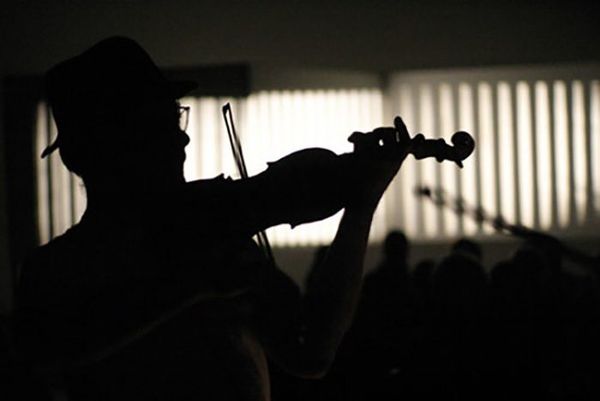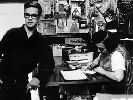Eye For Film >> Movies >> Tony Conrad: Completely In The Present (2016) Film Review
Tony Conrad: Completely In The Present
Reviewed by: Amber Wilkinson

Two things shine out from Tyler Hubby's documentary feature debut about filmmaker/composer and general avant-garde maverick Tony Conrad - the playfulness of the man himself and, in terms of his work, his bloody-minded patience.
Conrad, who died in April 2016, became known, almost despite himself. In early scenes here, we see him still busily working outside the house on New York's Ludlow Street, where he lived for several years when he was starting out and which cost the princely sum of $25.44 per month - unless he could persuade anyone to split it with him. Fiercely counter-culture, he essentially only worked when he needed the money which, he suggests wasn't that often, since we was willing to live on chicken hearts at 15 cents per pound from the local market.

It was in this unassuming (and toilet-free) room that the created much of his early music, alongside John Cale, Maria Zazeela and La Monte Young, among others - minimalist harmonics, driven by Conrad's violin, recordings of which went on to become a massive bone of contention between Young and the rest of the group. Although in his later life, Conrad would go on to take centre stage with his music, Hubby paints a vivid portrait of him as an influencer who moved from music into film, producing experimental work such as The Flicker - a film purely constructed from black and white frames.
"I loved long durations," says Conrad, and they have certainly marked out his work, whether it is the sustained notes on a violin, which one astute contributor here notes is physically very demanding, or his Yellow Movies - basically framed cheap emulsion on canvas that he hoped would age interestingly over the decades. Hubby has assembled an eclectic group of talking heads to discuss Conrad's influence, including Cale, Moby and curators of his work. It's the man himself who proves most compelling, however, whether he is talking about how much he hates institutions like New York's Lincoln Center "embeded in cement like this" or taking up teaching in order to tell students "how not to do things".
Hubby - who has made a name for himself as an excellent editor on films such as The Devil And Daniel Johnston and The Great Invisible - keeps things tight. A little too tight, in fact, as there's a sense of chunks of Conrad's life being somewhat glossed over, perhaps inevitable for a man who is largely being left to tell his own tale. Also, despite occasional pretensions - such as play and rewind buttons used at various points in the documentary - this is fairly traditional in terms of structure, although Hubby wisely includes large chunks of Conrad's music, so we get an immersive feel for the work. He also touches, all too briefly, on the ideas of art and 'worth', when one contributor notes that he was asked, when trying to buy some of Conrad's work for his gallery, "If it's so important, why is it so cheap?". A little more probing of these ideas would have been welcome, as would some deeper biographical elements. This ultimately works best as primer of an artist not easily contained and is likely to encourage viewers to want to learn more about his work.
Reviewed on: 30 Mar 2017














